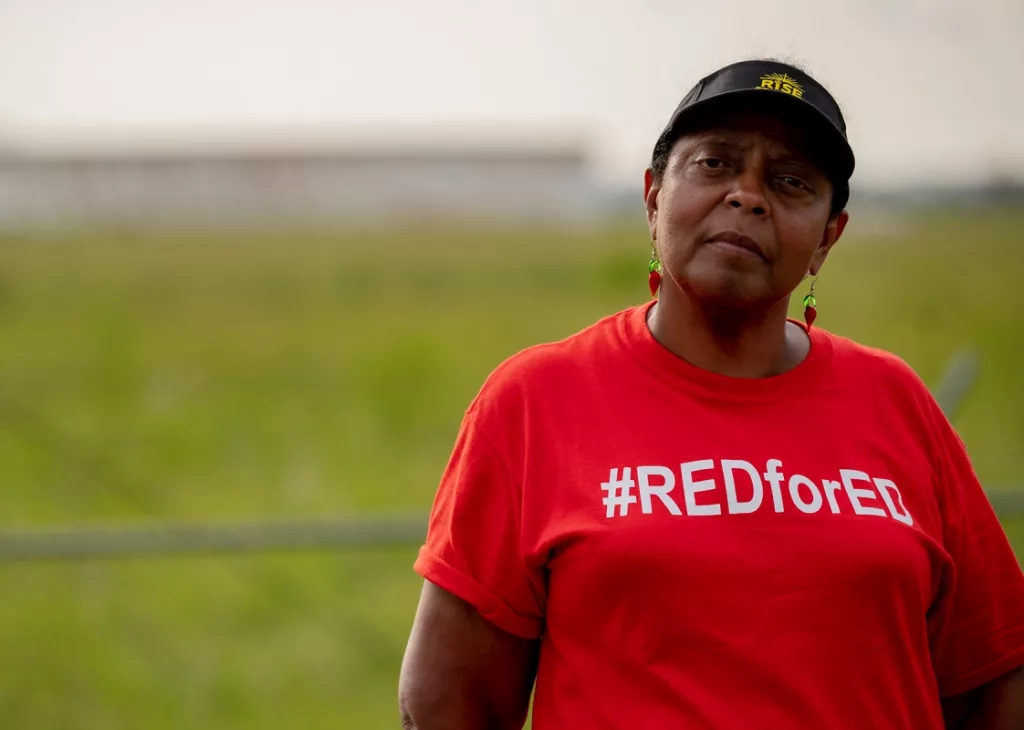Hurricane Ida Pounded Louisiana’s ‘Cancer Alley.’ Its Residents Need Help, and Demand Change.


Rolling Stone speaks with St. James resident and environmental activist Sharon Lavigne: ‘People keep calling me. They need generators. The sick and the elderly. I’ve given all our generators away.’
By Antonia Juhasz
In the eight days since Category 4 Hurricane Ida roared through her home and community in St. James Parish, Louisiana, 69-year-old Sharon Lavigne has watched crude oil spill out of a holding tank, seen flares shoot fire out of a petrochemical plant, and smelled a foul chemical stench from a fertilizer manufacturer. St. James Parish is located in the heart of Louisiana’s “Cancer Alley,” an 85-mile stretch of communities along the banks of the Mississippi River between Baton Rouge and New Orleans where some 150 fossil fuel and petrochemical facilities operate. The exceptionally elevated toxic air emissions released by the industry have put residents at greater risk of cancer and respiratory disease. Respiratory illness caused by air pollution, in turn, is a preexisting condition that makes Covid-19 more deadly, and the area continues to be ravaged by the ongoing pandemic.
And now, hurricane season. Hurricane Ida hit Southeast Louisiana with stronger winds than Hurricane Katrina, sinking vast swaths of the coastal areas underwater and decimating low-lying communities. Within hours, power was knocked out to more than a million Louisiana households and businesses, including all of New Orleans, and over 100,000 additional customers in Mississippi. Without electricity, water cannot be pumped through pipes, leaving 441,000 households in Louisiana dry, and another 319,000 on boil-water advisories — which can also require electricity. By September 6th, power was fully restored in Mississippi, but more than half of those who lost power in Louisiana were still without electricity.
With “feels like” temperatures in the triple digits, and power expected to be out for weeks, residents face further risk from the extreme heat. There is no power in St. James Parish, including to hospitals, stores, gas stations, and parts of the fossil fuel industry. At a press conference Sunday in St. James, Governor John Bell Edwards warned, “We have to assume that the next hurricane is going to come before we’ve recovered from this one. It may even occur before we’ve even finished responding to this one.”
Lavigne, whose family has lived in St. James for generations, was recently awarded the Goldman Environmental Prize for her work as founder and director of RISE St. James, a local community organization working to stop the industry’s pollution and expansion and implement a just transition to renewable energy.
The amount of damage caused by the fossil fuel industry in the wake of Hurricane Ida, in the form of oil spills, leaks, chemical releases, ruptures, and more, could dwarf the impacts of any previous storm system.
Two years ago, Rolling Stone wrote about Lavigne and the protest march she led with the Reverend Dr. William J. Barber II against the construction of yet another facility here, the proposed Formosa petrochemical plant. In the wake of Ida, when not busy documenting hazardous releases from the surrounding plants, Lavigne is trying to not only recover from the storm herself, but also to get assistance to the people of her community on St. James’ West Side, where the majority of residents are Black, low-income, and many are elderly with compounding health issues. Local groups such as Louisiana Bucket Brigade, Healthy Gulf, and Another Gulf is Possible have also stepped in to help residents meet basic needs.
I reached Lavigne in her home by phone on Sunday, September 5th. She voiced fears that it will take months for St. James to recover and frustration at the lack of support they’ve received from industry, and state, and local officials in response to desperate hurricane recovery needs. “I worry about people getting [even more] sick, that’s what I worry about,” Lavigne says.
This interview has been edited for length and clarity.
How are you, Sharon?
Hot and sweaty. Hungry.
You still don’t have electricity?
No, no. I sure don’t.
Do you have a generator?
I just got one yesterday. I had one [earlier] but I gave it to an elderly person. She needed it more than I did. I have one room with the air on and that’s it. Every night I go back and forth in that room just to catch air.
What are you doing for ice and water?
[Friends have come] and they bring up bags now and then. And I put it in my cooler, so it keeps the water cold.
Crude oil leaks from a Marathon storage tank in St James Parish.
Bryan Parras/Another Gulf Is Possible.
ARTICLE CONTINUES
TO READ THE FULL ARTICLE, HERE on ROLLING STONE’S WEBSITE

